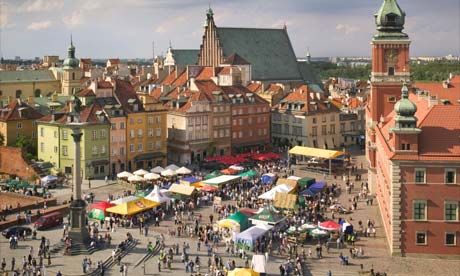
A distinguished Polish gentleman who could win a moustache competition greeted me at the door. He smiled a Father Christmas smile.
"Sorry, do I have the right place?" I mumbled in clunky, second-generation Polish. "It said 'staff entrance' outside so I wasn't sure."
"Tak, tak," he nodded, and switched to English to end the suffering. "You have right. I take jacket."
This is the way to U Kucharzy (The Chefs) Warsaw's most surreal eating venue. To simply call it a restaurant would be imprecise, because the experience is as much about performance as food.
In recent years Britain has seen the rise of the budget Polish deli, often reinforcing opinion that Polish cooking is unimaginative. But this isn't true, and a restaurant tour of Warsaw, starting at U Kucharzy, proves it.
The place is the brainchild of Adam Gessler, a former actor-turned restaurant entrepreneur. He acquired the old hotel kitchen of the Hotel Europejski, once a notorious meeting point for communists, gangsters and escorts, and has used it to perfectly blend his passions for cuisine and showing off.
Visitors now walk through a narrow passageway which opens out to a space as small as a studio theatre. It appears that nothing has changed since the glorious 1920s Warsaw of fun and prosperity.
The walls are clad in original white tiles, preoccupied cooks in white handle black, industrial-sized cooking utensils, and there is no microwave or blowtorch in sight. Two rows of chairs behind two long, narrow tables face the cooking area. The audience - the diners - don't take their eyes off the show.
Each of the waiting staff has a distinct character. There is the slick young man in a natty suit who reels off today's specials and the estimated time by which the goose or venison will have finished roasting.
He can tell you which local organic farm the meat was sourced from, and when. (Poles are usually baffled when you ask if the food is organic, as most of it is by default.) Then there is the middle-aged woman who has an air of barely tolerating your presence and the ruddy-faced man who gives a loving account of his list of very good wines.
The biggest treat is to see your own order being assigned to a particular chef, and for him to walk over from the stove with the pan to place the meal on your plate, while telling you how he made it.
If you order steak tartar, the ingredients including an egg yolk, onions, anchovies and capers will be wheeled to where you are sitting so you can see the freshness of the meat, and its exquisite preparation, in close-up. The menu is a very simple combination of good roast meats and tasty vegetables. Critics might call it peasant food, but it's full of flavour, tastes natural and comes from smaller farms.
All this commotion is accompanied by a grandmother at a grand piano, playing well-known jazz, blues and classical pieces - and inevitably some Chopin. Nothing is too serious at U Kucharzy, and the lady was happy to give an impromptu music lesson to an inquisitive toddler.
Nothing is pompous either, and students on the bargain lunch menu sit comfortably next to businessmen riding high on Poland's economic boom.
The set weekday lunch menu is 30 zloty (£7). Dinner meals cost around 100 zloty (£23 ) per head including a glass of wine.
For after-dinner drinks, next door is a bar extension named A la Fourchette, which is open 24-hours-a-day, seven days a week, serving a range of vodka shots, small beers and Polish canapés for 4 zloty (94 pence) each.
The barman is so grumpy that regulars suspect he is putting on communist-era rudeness.
Fans of Szarlotka, or Tatanka, the Polish cocktail of Zubrówka (Bison grass vodka) mixed with apple juice, may like to try increasingly popular Zoladkowa, a liqueur-like herb vodka reminiscent of Bénédictine. When cut fifty-fifty with freshly squeezed lemon juice, the sweetness is neutralised and the combination is dangerously delicious.
U Kucharzy is not the only great Warsaw restaurant to visit. Rózana Restauracja Polska has been decorated like an old mansion house and serves Polish classics such as rye soup and mushroom dumplings. The Boathouse on the east bank of the river, is a wooden building with a spacious garden looking on to the rushes. Back across the river, in the 18-century Lasienki park, the glamorous Belvedere restaurant serves more fancy Polish food inside a verdant conservatory.
Getting there
Centralwings, EasyJet, Lot Polish Airlines and Wizz Air all fly to Warsaw from airports across the UK.
National Express coaches drive from London to Warsaw. The journey takes around 26 hours.
By train: Take the Eurostar from London to Brussels, then highspeed train from there to either Cologne or Berlin. The overnight sleeper train runs from Cologne to Warsaw or the Berlin-Warszawa Express from Berlin to Warsaw. For full details and to book see The Man in Seat 61.
Restaurant details
Belvedere, ul. Agrykoli 1, +48 (0) 22 841 22 50.
U Kucharzy, ul. Ossolinskich 7, +48 (0) 22 826 79 36.
Rózana Restauracja Polska, ul. Chocimska 7, tel. +48 (0) 22 848 12 25.
Boathouse, ul. Wal Miedzeszynski 389a, +48 (0) 22 616 32 23.
Accommodation
The 5-star Hotel Rialto on ul. Wilcza 73, Poland's first boutique, is an art historian's dream. Each room is uniquely designed, including the Belgian Art Deco suite, a William Morris suite and a Viennese Secession suite, all containing original antique furniture. Double rooms start at €130 (£103). +48 (0) 22 5848700
For budget travellers, try the Oki Doki hostel at Pl. Dabrowskiego 3, with double rooms for under 207 Zloty (£49). There is something quirky about each room, such as the Narnia and Communist-themed dorms. +48 22 826 51 12

